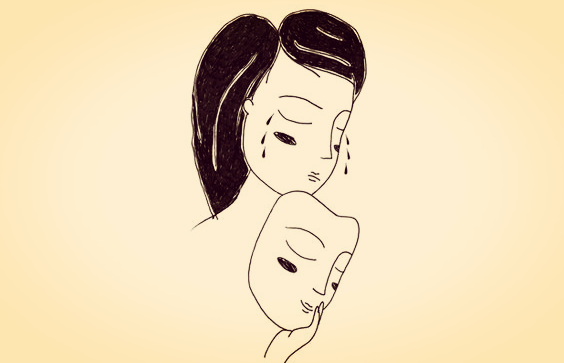Living With Humor or Anger


Written and verified by the psychologist Valeria Sabater
There are people who always seem to have the knack of making light of difficult situations and making you laugh until your sides are splitting. They do it because that’s what they’re like. They do it because life, for them, has music and rhythm and is nowhere near as complicated as people make it out to be. On the other hand, there are people who argue about nothing and are blinded to everything. They only see walls where others see bridges. They create a storm when all is calm, and cause divisions with their anger. And so, living with humor or living with anger: the choice is ours.
Why are human relationships so complex? We could bring to mind that overused saying, that it is better to avoid those who like to disturb our psychological stability, and only spend time with those who give us joy. However, even though this is the best option for a healthy mind, it is not always possible. As we live with others we have to get to know how to understand their perspectives and, above all, learn how to survive in every situation, whether we are living with good people or angry dragons.
Living with humor
“Life must be lived with love and humor. Love to understand it and humor to endure it “
It’s often the case that those who argue about everything are going through a depression. And in other cases, those who laugh at everything are sometimes hiding an aggressive or even self-destructive nature. Every type of behavior has its extremes and there is a meaning behind everything. Therefore we have to understand them, we need to learn how to read and interpret these people from other “worlds”, who affect and influence us as they orbit around us.

Are the people who make us laugh about everything always happy?
Peter McGraw is a psychologist at the University of Colorado, famous for having created the “humor laboratory.” They study the influence of humor as a form of therapy and the use of laughter as a “drug” to improve the quality of life of chronically ill or cancer patients. Science supports these initiatives, although it has been shown that, rather than laughter, what really improves the daily life of these patients is their attitude, optimism and inner strength.
In his theory, Dr. McGraw has identified 4 types of humor. It’s important to realise that many of the people who make us laugh about everything, are not always happy themselves. They don’t always reflect of a positive state of mind. It is worth delving into these categories to better understand this type of dynamics that we see in our day to day lives.
- Aggressive humor: This type of humor is very common in those who make us laugh using irony and cynical sarcasm, where it is designed to ridicule third parties.
- Humor as self-improvement: This type of humor is one of the healthiest ones, as it helps us to manage stress. It is evident when someone is able to laugh at himself when looking back on a bad day or a mistake he has made. Here we can also include the use of ironic humor, when we laugh at how we never get better at a certain activity or task. It is also very helpful in removing tension at any given moment.
- Self-abusive humor: This is the other side of the humor mentioned above. It is a type of self-abuse, as we use humor against ourselves in a destructive way. This type of humor is often used in cases of particularly low self-esteem, because of the onset of a depression or when a person seeks to victimize themself and attract the attention of those around them.
- Affiliative humor: Here we have the most useful and wonderful type of humor. It is the humor that that comes from someone who makes us laugh in order to bring us closer together, to build understanding and to bring happiness and well-being.

Taking all this into account it becomes clear that when we say that someone has a “great sense of humor” we really need to know what kind of humor he uses and how that humor influences those around him. For example, have all experienced the feeling when someone makes us laugh, but then afterwards we feel uncomfortable as we realise the humor has a malicious intent.
Those who argue about everything … do they enjoy making our lives difficult?
Tal Ben-Shahar, a professor of Positive Psychology at Harvard is known to be the “happiness guru”. His numerous publications on emotions and moods are always an interesting reference when it comes to understanding certain behavior patterns better, such as what is behind those people who argue about everything and who seem to enjoy causing difficulties for themselves and for others?
“Bad humor makes us very small.”
-Domenico Cieri Estrada
The answer is simple: unhappiness. This is something that nobody deserves to experience, but behind it all there is a whole kaleidoscope of badly managed and badly resolved situations. For example: the inability to cope with frustration, poor strategies for solving problems, unrealistic expectations, tunnel vision, lack of reflective thinking, low self-esteem, low emotional intelligence …

We can all go through times like these – difficult moments where different things can trigger a weakness inside us that makes us start seeing problems everywhere we go. As a result our positivity is affected, and any normal conversation can turn into an argument. We can all fall into the depths of discouragement and unease, it is quite normal and understandable.
However, what is absolutely essential is to emerge from these toxic waters and find ourselves again. To achieve this we’ll need willpower and self-control. Stop considering yourself a victim, it’s just a matter of picking up the broken pieces and repairing each part with the glue of self-esteem and the varnish of motivation. In this way, we will also understand that not all those who laugh are happy, and not all those who argue about everything are lost causes. We can all heal ourselves, we can all find balance and happiness.
There are people who always seem to have the knack of making light of difficult situations and making you laugh until your sides are splitting. They do it because that’s what they’re like. They do it because life, for them, has music and rhythm and is nowhere near as complicated as people make it out to be. On the other hand, there are people who argue about nothing and are blinded to everything. They only see walls where others see bridges. They create a storm when all is calm, and cause divisions with their anger. And so, living with humor or living with anger: the choice is ours.
Why are human relationships so complex? We could bring to mind that overused saying, that it is better to avoid those who like to disturb our psychological stability, and only spend time with those who give us joy. However, even though this is the best option for a healthy mind, it is not always possible. As we live with others we have to get to know how to understand their perspectives and, above all, learn how to survive in every situation, whether we are living with good people or angry dragons.
Living with humor
“Life must be lived with love and humor. Love to understand it and humor to endure it “
It’s often the case that those who argue about everything are going through a depression. And in other cases, those who laugh at everything are sometimes hiding an aggressive or even self-destructive nature. Every type of behavior has its extremes and there is a meaning behind everything. Therefore we have to understand them, we need to learn how to read and interpret these people from other “worlds”, who affect and influence us as they orbit around us.

Are the people who make us laugh about everything always happy?
Peter McGraw is a psychologist at the University of Colorado, famous for having created the “humor laboratory.” They study the influence of humor as a form of therapy and the use of laughter as a “drug” to improve the quality of life of chronically ill or cancer patients. Science supports these initiatives, although it has been shown that, rather than laughter, what really improves the daily life of these patients is their attitude, optimism and inner strength.
In his theory, Dr. McGraw has identified 4 types of humor. It’s important to realise that many of the people who make us laugh about everything, are not always happy themselves. They don’t always reflect of a positive state of mind. It is worth delving into these categories to better understand this type of dynamics that we see in our day to day lives.
- Aggressive humor: This type of humor is very common in those who make us laugh using irony and cynical sarcasm, where it is designed to ridicule third parties.
- Humor as self-improvement: This type of humor is one of the healthiest ones, as it helps us to manage stress. It is evident when someone is able to laugh at himself when looking back on a bad day or a mistake he has made. Here we can also include the use of ironic humor, when we laugh at how we never get better at a certain activity or task. It is also very helpful in removing tension at any given moment.
- Self-abusive humor: This is the other side of the humor mentioned above. It is a type of self-abuse, as we use humor against ourselves in a destructive way. This type of humor is often used in cases of particularly low self-esteem, because of the onset of a depression or when a person seeks to victimize themself and attract the attention of those around them.
- Affiliative humor: Here we have the most useful and wonderful type of humor. It is the humor that that comes from someone who makes us laugh in order to bring us closer together, to build understanding and to bring happiness and well-being.

Taking all this into account it becomes clear that when we say that someone has a “great sense of humor” we really need to know what kind of humor he uses and how that humor influences those around him. For example, have all experienced the feeling when someone makes us laugh, but then afterwards we feel uncomfortable as we realise the humor has a malicious intent.
Those who argue about everything … do they enjoy making our lives difficult?
Tal Ben-Shahar, a professor of Positive Psychology at Harvard is known to be the “happiness guru”. His numerous publications on emotions and moods are always an interesting reference when it comes to understanding certain behavior patterns better, such as what is behind those people who argue about everything and who seem to enjoy causing difficulties for themselves and for others?
“Bad humor makes us very small.”
-Domenico Cieri Estrada
The answer is simple: unhappiness. This is something that nobody deserves to experience, but behind it all there is a whole kaleidoscope of badly managed and badly resolved situations. For example: the inability to cope with frustration, poor strategies for solving problems, unrealistic expectations, tunnel vision, lack of reflective thinking, low self-esteem, low emotional intelligence …

We can all go through times like these – difficult moments where different things can trigger a weakness inside us that makes us start seeing problems everywhere we go. As a result our positivity is affected, and any normal conversation can turn into an argument. We can all fall into the depths of discouragement and unease, it is quite normal and understandable.
However, what is absolutely essential is to emerge from these toxic waters and find ourselves again. To achieve this we’ll need willpower and self-control. Stop considering yourself a victim, it’s just a matter of picking up the broken pieces and repairing each part with the glue of self-esteem and the varnish of motivation. In this way, we will also understand that not all those who laugh are happy, and not all those who argue about everything are lost causes. We can all heal ourselves, we can all find balance and happiness.
This text is provided for informational purposes only and does not replace consultation with a professional. If in doubt, consult your specialist.







